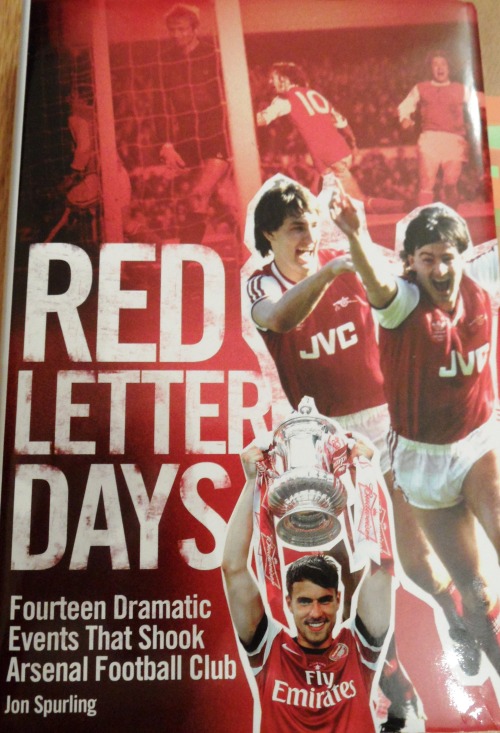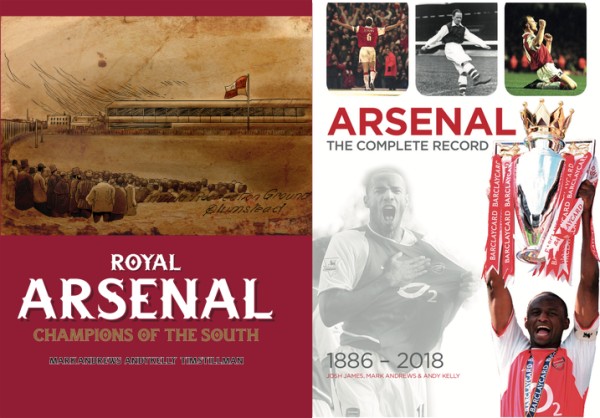Red Letter Days by Jon Spurling

A Book Review by Mark Andrews
This is an entertaining read that, like his earlier works, has a fair amount of quirkiness which means it is not a standard account. It loses nothing for this and is especially effective and revealing in the post WW2 years.
Below are, in my view, the stand out features of the book which, within its 14 chapters, contains some absolutely fantastic quotes.
The most interesting piece of info as far as I am concerned is a short section about the crowd reception that Arsenal faced in the 1930s at away grounds. This was not a new thing as, during my crowd research, I found that in our first game at Newcastle in 1893 our players had stones thrown at them by the crowd, for which the Newcastle committee apologised to director Fred Beardsley.
What Spurling picks up is the intensity of which the crowd barracking, especially at Manchester and the North-eastern clubs – the Smoggies, Mackems and Geordies – increasingly gave to our multi-title and cup winning players during the post-Chapman 1930s. Unsurprisingly, Wilf Copping would regularly enquire if the miscreant would like a chat after the game, but never found any takers!
The abuse they received for being “flash cockneys” is shown to be deeply ironic, as the players lifestyles were anything but.
Then, after the war, a chapter about austerity (that’s proper post-war austerity not the ersatz nonsense bandied around today) about Ronnie Rooke and Joe Mercer is fascinating mainly due to the verbal stick they would give each other. My dad began going to Highbury in 1946 and when I asked him about it he mentioned one man. Ronnie Rooke, the man with the rocket shot, was his overriding memory. The chapter about him and knobbly kneed Joe Mercer is vastly entertaining but has a sad ending as it notes the passing of a true Arsenal man, Tom Whittaker in 1956.
The early 1970s is very cleverly made into a tale of two Hillsborough semi-finals. The first stars Peter Storey, a very hard player who is described rather amusingly by his 1970s Chelsea hardman counterpart Ron “Chopper” Harris as “the bastard’s bastard”. The manner in which, with hindsight, the whole 71 Double hinged on his last minute penalty is expertly detailed, as is the Stoke reaction to choking after they took a two goal lead, which was in direct contrast to Storey’s bottle.
The second semi-final at Hillsborough ‘stars’ Jeff Blockley who is described accurately thus: “With the exception of Gus Caesar there hasn’t been a more derided player in Arsenal’s history”, and proceeds to describe how he let Sunderland in to win the game.
Fast forward to the start of the reign of George “Gaddafi” Graham where the League Cup semi-final win over Spurs was key for the club. This is encapsulated by Paul Davis who states that, uncharacteristically, GG was congratulating all players after the game and is quoted as saying very accurately:
“That night was the spiritual regeneration of the club. You can never underplay the significance of the semi-final win over Spurs. It was the stepping stone for everything which George achieved.”
Another telling quote shows in a nutshell how GG altered the Arsenal mindset from perennial underachievers to winners, as just before Graham arrived Nick Hornby said this of the pre GG team:
“That Arsenal team … would never be bad enough to go down, but never good enough to win anything, and the stasis made you want to scream with frustration.”
He did this, we are shown, by using the wisdom of the man who the Superbowl trophy is named after as inspiration. Who would have thought that Graham had studied NFL coach Lombardi and used such gems as “show me a good loser and I’ll show you a loser” on the team to lead them to the League Championship in 1989.
On the way to the Championship he recounts the documentary when Arsenal played Millwall, with referee David Elleray wired up so the viewers could hear the players’ and officials’ interactions. It was good that Jon highlighted it as the only bit of it that I remembered was Adams’ shot which went over the line, but wasn’t given and his “fucking cheat” comment sounding like he was on helium to the referee getting him booked.
After the final trophy, the European Cup-Winners Cup, Spurling then tracks the decline, referring to the post GG period just as Bergkamp arrived as resembling a film: “Carry on Arsenal”
Along came the present incumbent and there are a number of insightful comments, the most pressing being that while all eyes were on the 2004 season, the storm clouds were gathering to contribute to a bleak future. These centred around the failure to win ANY European trophy and the loss to Chelsea of Ashley Cole, a London born Arsenal fan, denoted that Arsenal had become a selling club.
The startling fact that Wenger won seven trophies in his first 497 games and then waited another 513 games for his last one is given due credence in a chapter entitled “and Mercury orbited the sun 32 times”, which is apparently the number of times this occurred in the Wenger trophy drought years.
To end this review here’s a remarkably prescient quote from Willie Young in 1999, who remarked to Jon in his first set of interviews with players:
“It’s Arsenal’s way. They have a sudden burst of success, then seem to rein everything back in and become overly cautious and conservative, like they want to start again from a blank canvas”.
I thoroughly enjoyed the book and recommend it for the writer’s insight into events as seen through a slightly different angle than usual. Jon’s book can be purchased here on Amazon or direct from the publisher.
Jon has his final book signing at:
Chelmsford Waterstones – Saturday 6th December from 11.00am to 1:00pm.
—————–
Don’t forget to subscribe to the blog (top right). You know it makes sense.
Or have a look at our other site: The Arsenal Collection for more Arsenal memorabilia.
Copies of our books Royal Arsenal – Champions of the South and Arsenal: The Complete Record 1886-2018 are still available from the publishers.

